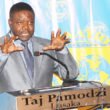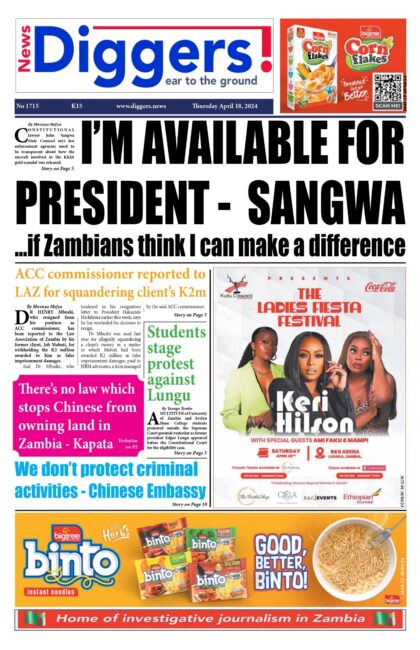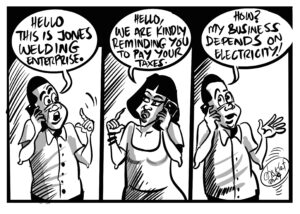I recently attended a social occasion in Lusaka. The event, not unusual in the capital city, brought together Zambians from disparate ethnic groups such as Kaonde, Lunda, Tonga, Bemba, Chewa/Nyanja and Lozi speakers. It was a diversity that gave meaning to the slogan ‘One Zambia One Nation’. Yet, as one Tonga guest arrived, they were greeted in the Tonga language by another Tonga, a cousin whom they had noat seen for a long time and who had arrived at the party much earlier. Both Tongas were swiftly reprimanded by a Bemba speaker who told them ‘Mwatampako…mwalitemwa icitundu cenu’, literally translated as ‘You are at it again. You love your language too much!’ The Bemba guest was of course speaking in Bemba and saw no contradiction in his attempts to marginalise the Tonga guests in this way.
Sadly, what I witnessed that day is not an isolated incident but a microcosm of what is happening in Zambia at present. In places like urban Lusaka, it is somehow regarded as acceptable to communicate in Bemba and Nyanja languages, while those conversing in Tonga are frowned upon or treated with disdain. Language has been retooled to function as an instrument that fosters exclusion or belonging, especially in public spaces. More importantly, those with Tonga names are being victimised and marginalised in workplaces, especially in the civil service, parastatals and security wings. I know of many Tongas working in these sectors who have been removed from their positions over the last year or retired in ‘national interest’. One recent and troubling example is the unexpected dismissal of Richard Mwiinga, the Chief Executive Officer (CEO) of the Public Service Pensions Fund (PSPF) in December 2017.
By all accounts, Mwiinga was an exemplary public servant. His achievements over the last three years include stabilising the Fund, initiating progressive pension reforms and embarking on sustainable investments such as the US$72 million Longacres Mall Project that has reached an advanced stage. When his contract came up for renewal, the feedback on his performance was sought from both the board and management of the PSPF. Procedurally, the task of evaluating the performance of the CEO rests with the chairperson of the Fund’s board, a position that until recently was occupied by Moses Banda. Perhaps under pressure from State House and some members of the board not to renew Mwiinga’s contract, Banda informed the board that he wished to constitute a Select Committee to guide him in assessing the CEO’s performance, arguing that the Fund’s different committees know his performance better than him. The board approved Banda’s suggestion and a Select Committee comprising the chairpersons of its different committees was subsequently constituted under his leadership.
Using the standard template approved by the board over a year ago under its Performance Based Management Guidelines for senior personnel, the Select Committee met to evaluate Mwiinga’s performance as CEO. The PSPF Management, in line with the Fund’s evaluation guidelines, also assessed Mwiinga’s performance separately. According to well-placed sources from Cabinet Office and State House, both the Select Committee and Management recommended that Mwiinga’s contract be renewed, and separately communicated their respective positions to Banda, the PSPF board chairperson. In the unanimous judgement of the Select Committee, Mwiinga had discharged his duties effectively, and his performance was rated at 86 per cent, four per cent less than the score (90) that he received from the PSPF Management. At a full board meeting called by the chairperson to consider the recommendation for the renewal of the CEO’s contract, two board members however deemed it necessary to consult other unspecified powers beyond the board about Mwiinga’s performance. The proposal by the two, Barnaby Mulenga, Permanent Secretary in the Ministry of Labour, and Boniface Chimbwali, who is Public Service and Management Division Permanent Secretary, was opposed by the board chairperson, Banda, and another board member Oliver Saasa, on grounds that the law relating to the renewal of contract of the Fund’s CEO does not provide for a consultation process that involves actors external to the board. The protesting officials however defended their position, prompting the rest of the board members to grant them their wish. Mulenga and Chimbwali were given a week to carry out their consultations before reporting their findings to the full board. Significantly, one of those consulted was President Edgar Lungu.
At a subsequent meeting called on 8 December 2017 to conclude the process of renewing Mwiinga’s contract, Lungu then quickly acted to dismiss the board chairperson and Saasa, both of whom had earlier insisted on acting in accordance with the law. Tellingly, Banda and Saasa were handed their letters of dismissal, which were dated 8 December 2017 but backdated to 4 December 2017, by Mulenga just before the meeting commenced. The Ministry of Labour PS further revealed that President Lungu had also appointed him as the interim chairperson of the board and, using his new position, proceeded to inform Saasa that he could no longer take part in any activities of the board since his dismissal was instant. As for Banda, he was told that, to ensure a smooth handover to the new chairperson, his complete removal from the board would only take effect after a month, on 3 January 2018.
When the meeting finally started, Mulenga informed the remaining board members that President Lungu had decreed that Mwiinga’s contract be terminated on 28 February 2018, when it expires. A dissenting member who attempted to deliberate further on the issue was curtailed on grounds that the presidential directive was final. Mwiinga was then called back into the boardroom and informed that “the board” had decided not to renew his contract when it ends. This is a troubling episode, one that must have been very humiliating for Mwiinga, and it illustrates two broader points.
The first is that the unpleasant manner in which Mwiinga was removed from his position underlines the wider and continuing ill-treatment of Tongas or those with Tonga identities under President Lungu’s Zambia. Unfortunately for these fellow citizens, the very person who should guarantee them protection, the President of the Republic of Zambia, appears to be an active participant in their mistreatment. I do not know if, in dismissing Mwiinga, Chimbwali was acting as Lungu’s proxy or if he was taking advantage of Lungu’s apparent distaste for Tongas to advance his own – possibly ethnic – agenda. What I know is that the President’s action towards Mwiinga reinforces the perception that he retains a deep-seated antipathy towards Tongas and regards them as less Zambian. Is it a sin to be a Tonga in Lungu’s Zambia? Of Zambia’s four major ethnic groups, it is only Tongas who are not represented in his Cabinet. Of Zambia’s ten provinces, only Southern lacks representation. Lungu may argue that the ruling party did not win any parliamentary seats there, but the Constitution allows the President to nominate up to 8 Zambians to Parliament to address such electoral imbalances and other special interests. Lungu therefore has no excuse for his continued marginalisation of Tonga speakers other than that he is unhappy that Tongas in Southern Province have the temerity to reject him at the polls and he is consequently punishing them for their support for the opposition United Party for National Development (UPND) and its leader Hakainde Hichilema.
When a Republican President in a constitutional democracy begins to imagine himself primarily as a leader of those who voted for him and to treat citizens who support the opposition as his adversaries, then he becomes, in that moment, a danger to national peace and unity. The earlier Lungu realises that he is presiding over a deeply fractured society and takes corrective measures, the better. Left unchecked, the continued victimisation and marginalisation of Tongas will end in grief, great grief, for the country. One potential outcome is that the long cherished slogan, ‘One Zambia One Nation’, will start to ring hollow and may as well be modified to read as ‘One Zambia, Two Nations’, with one nation, the PF one, reserved for supporters of the ruling party and the other, the UPND nation, reserved for the opposition.
Ironically, Lungu’s efforts to exclude Tongas from Cabinet and wider public life, alongside the failure of his administration to devise specific policies that appeal to their economic way of life, represent the very factors that have driven Tonga nationalism since independence. Tongas, rightly or wrongly, feel excluded from political power and this latest campaign by Lungu will only strengthen this perception. Unfortunately, Lungu appears to have no interest in winning the Tongas over; he seeks only to push them out. Like many other Zambians, the President seems to have taken an easy way out, believing that the support that Hichilema and the UPND enjoy in Southern Province is a result of ethnic particularism. The question that Lungu needs to ask himself and answer is: ‘What is it that Tongas believe Hichilema and the UPND will do for them that I am not doing?’ In my view, ethnicity is not the answer; it is that which needs to be explained.
I know that what I have said above may not sit easily on the minds of some of my fellow citizens, who may even accuse me of fanning ethnic divisions, but my pen, as does my voice, runs on with my truth. I must either say what is in me or remain silent. I am an advocate of freely sharing views and ideas, without any inhibitions or hierarchies. I acknowledge that Tongas who are working in the civil service, parastatals and defence forces do not deserve any special treatment and should be removed from their positions when their performance or conduct merits it, but even then, they should be treated fairly and subjected to the same procedures and standards as other government or parastatal employees belonging to other ethnic groups. Most importantly, I raise these concerns in the hope that the hard reality of ethnicity, mostly deployed by our political class, can be ventilated, openly debated, so that we may uncover the real reasons behind all the ‘national divisions’ and that those of us who are not Tongas can hear the cry of our fellow citizens who are. Although it has intensified under late President Michael Sata and now Lungu’s rule, the ethnic problem in our country is historical and much deeper. In fact, I have a very uncomfortable feeling that Zambia may be paying for the sins of our ‘nationalists’ – founding president Kenneth Kaunda and his friends – who never resolved the ‘ethnic question’ in favour of the ‘national question’. They papered over the obvious cracks, but failed to create a nation (consummation of the struggle for national emancipation entails securing full economic and social sovereignty for ALL the people in a ‘nation’).
Resolving the complex ethnic question properly calls, among other things, for a mature and well-informed national conversation on ethnic oppression, discrimination and exclusion. One of the potentially effective ways of dismantling our ethnically coloured political system is by working for increased understanding in the society of the insidious and pervasive ways in which ethnic exclusion functions. This requires a willingness to re-examine what would be regarded as normal and everyday. It presupposes opening up the subject of ethnic marginalisation – no longer isolating and alienating those who dare to raise it. It involves listening and creating the spaces to hear the hurt, anger and aspirations of those expressing ethnic oppression. It means dragging the subject of ethnic exclusion from the hushed conversations and murmurs and silences into the arena of public discussion. The question is: who will lead that national conversation?
The second point is that the removal of Mwiinga, who by all accounts was professional and competent, underlines the political interference that undermine the effective functioning of regulatory authorities in Lungu’s Zambia. It also demonstrates the vulnerability of public servants who carry out their responsibilities with the required levels of professionalism, independence and integrity in a political climate that rewards bootlicking and overlooks talent and ability. How else does one explain Lungu’s unexplained refusal to renew Mwiinga’s contract if not for his preference for sycophants who do as he pleases? In this vein, we may understand the dismissal of Banda, who is from the same province as Lungu, as a consequence of fractional elite struggle over ‘accumulation’, the underlying driving energy. In Lungu’s world, ethnicity is important only as a social platform for organising ‘accumulation’. Banda’s removal derived from his ‘failure’ to recognise this principle and consequently deliver a favourable outcome for Lungu and his accumulation-seeking friends. It is worth noting that the Pensions Fund is responsible for administering and investing the incomes of millions of working Zambians. This asset probably represents a lucrative prize for Lungu and the businessmen in his inner circle, who are seeking nothing but ownership, control, distribution and consumption of wealth and human labour power. By removing Mwiinga, Lungu may have sought to achieve a double objective: further marginalising Tongas in public life and removing a potential obstacle to the looting of public resources. Just what kind of Zambia does Lungu seek to construct and leave behind?
For any feedback, please email [email protected]












